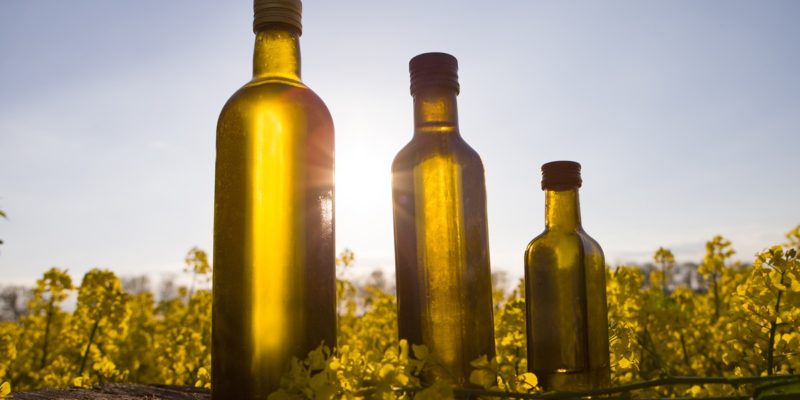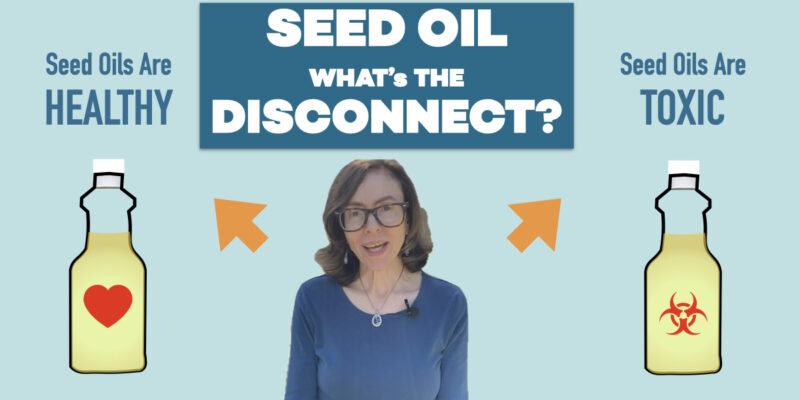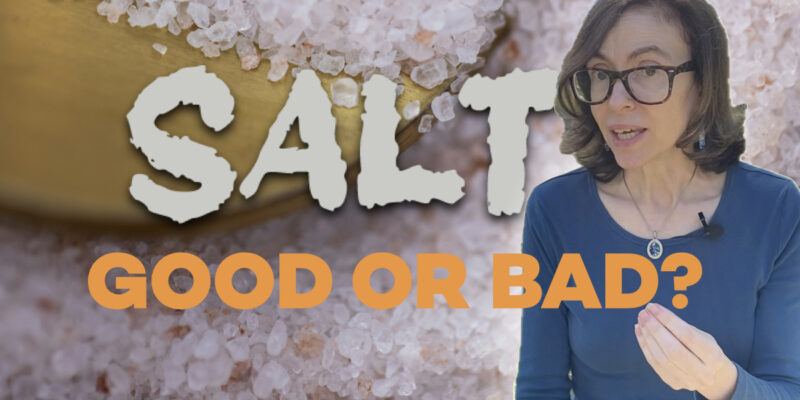Since avoiding seed oils has become a trend, the newest trend debunks the idea that we need to avoid them. This post debunks the debunkers.

Seed oils: Questions and answers for your health
Table of Contents
- What is a seed oil?
- What are the Hateful 8 seed oils?
- Are seed oils bad for your health?
- Why are seed oils bad?
- Why do Harvard and Health Authorities like the American Heart Association Say Seed Oils Are Safe?
- What seed oils I should avoid?
- What is a vegetable oil?
- What is the difference between vegetable oil and seed oil?
- Is vegetable oil considered a seed oil and is it bad for you?
- What are the Hateful 8 Seed oils?
- Which cooking oils are good for your health?
- What seed oils should I avoid and not cook with?
- Can I cook with good oils that are refined?
- Should I not consume fish oil?
- Why is sesame seed oil on your list of good fats?
- What about hemp oil and black seed oil?
- Do seed oils cause disease?
- Is canola oil bad for you?
- Is coconut oil bad for you?
- Is palm oil bad for you?
- Is olive oil considered a bad seed oil?
- Is peanut oil considered a bad seed oil?
- Is avocado oil considered a bad seed oil?
- What about soy oil? Is it bad?
- What does hydrogenated oil mean?
- What about expeller-pressed oils?
- Is high-oleic sunflower oil better and should I eat it?
- Why are olive oil, palm oil, and other good oils not so bad?
- What about eating corn or soybeans or sunflower seeds?
- Why are some refined vegetable oils and seed oils toxic?
- Why is grapeseed oil bad?
- What foods contain seed oils?
- Do you recommend a seed oil-free shopping list?
- What are seed oil-free restaurants I can go to?
- What is the connection between PUFAs or polyunsaturated fatty acids and seed oils?
- Other common questions and where to find answers:
Questions about seed oils are among the top queries I get from visitors to DrCate.com and readers of my books, so I have compiled the most common questions in this post. You can also enjoy a deep discussion of seed oils and vegetable oils in each of my books. The FatBurn Fix explains how seed oils cause obesity and metabolic disease. Deep Nutrition details how seed oils cause brain disease and heart attacks. Many scientific references support these claims. I’ve listed some here.
That said, here are handy answers to the questions people frequently ask about seed oils:
What is a seed oil?
Seed oils are oils that come from seeds, as opposed to the fruit or pulp, of a plant. Not all seed oils are bad, it depends on the processing and the fatty acid composition. For example, peanut oil can be healthy when unrefined and even when refined is still OK. (See the full list of good and bad fats here.)
This article is continued below...(scroll down)
The health impact of seed oils, whether good or bad, comes from the fatty acid profile and a few other factors, like how easily the oil is extracted and how much refining is required.
Based on those factors, I have identified what I call the “hateful eight” seed oils that nobody should eat.
What are the Hateful 8 seed oils?
The Hateful 8 seed oils are:
- Corn oil
- Canola oil
- Cottonseed oil
- Soy or soybean oil
- Sunflower oil
- Safflower oil
- Grapeseed oil
- Ricebran oil
Are seed oils bad for your health?
The 8 processed seed oils listed above are terribly unhealthy. Eating them in the amounts we now do makes it impossible to avoid serious health consequences. So much so, that most of what I see and treat in my practice is related to seed oil toxicity.
If you’d like to learn how seed oils have affected you, how getting off seed oils can help, and how to get started, I can help you do exactly that in a telehealth consultation.
If you’re interested in learning on your own, I’ve written three books about these consequences (and am working on number four).
Why are seed oils bad?
The Hateful 8 seed oils I’ve identified are unhealthy because they contain large amounts of unstable fatty acids that can break down into toxins during cooking and inside our bodies. These oils should not be heated. But they are heated during factory refining and many toxins form. Some of these toxins can be removed, but not all. A final step, called deodorizing, creates toxic compounds that can’t be removed. What’s more, most of these oils will be used for cooking, and this generates more toxins.
The unstable fatty acids fall into a category called polyunsaturated fatty acids. (you’ll see them referenced as PUFAs). PUFA should not represent more than 10% of our diet because of this instability, and probably 2-3% would be better since that’s more in alignment with our historical intake.
Two main reasons.
One, the money. The AHA was a small underfunded professional society until 1948 when Procter & Gamble, makers of Crisco, donated $1.7 million. Ever since then, the AHA has promoted polyunsaturated fat as healthy.
Two, they claim to have science backing them up. They do not. All of their studies are flawed in one way or another. I discuss an in-depth example in the video linked to above also. It takes a lot of training and detective work to recognize these flaws, and most doctors are way too busy for all of that. So most doctors are going to go along with Harvard and the other health authorities’ recommendations. This is truly tragic.
For more info on how we’ve been fooled about cholesterol, visit this page.
What seed oils I should avoid?
The Hateful 8, listed above.
Other seed oils sold as supplements, like hemp, flax, and black seed oil, just to name a few, are not as toxic. However, their value as supplements is highly questionable.
For a handy list of good fats and bad that you can print out, click here: List of good fats and oils versus bad fats and oils.
What is a vegetable oil?
Vegetable oil is a term for any plant-based fat. It includes the hateful 8 seed oils and in addition, it technically includes healthy fats like olive, avocado, coconut, palm, and peanut.
However, when you see the term “vegetable oil” on the ingredients label it almost never means olive oil or avocado oil. And the ingredients list usually specifies exactly which vegetable oils they might be adding so you don’t have to guess.
What is the difference between vegetable oil and seed oil?
Vegetable oil is the broader term. Seed oil is a subset of vegetable oil.
I’ve used the terms interchangeably in the past because for the most part when you’re looking at ingredients you’re going to find mostly the Hateful 8 seed oils listed after the term “vegetable oil” rather than olive oil or avocado.
When I wrote Deep Nutrition, coconut and palm were not in wide use. So that’s why I used the term Vegetable oil instead of seed oil. However, now coconut and palm are in wider use and those are not seed oils because they come from the fruit of the plant, not the seed. They are vegetable oils.
I’m now using the term seed oil more often than the term vegetable oil, which I used in the past, because of the increased use of palm and coconut in the food supply and it is technically more correct.
Is vegetable oil considered a seed oil and is it bad for you?
If you see “vegetable oil” on an ingredients list, it’s followed by “May contain one or more of the following” and then a list of two or more oils. If that list includes one of the hateful 8, then avoid it. On the other hand, if the list includes palm or coconut, it’s ok.
What are the Hateful 8 Seed oils?
Because neither seed oil nor vegetable oil is a perfect term for the subset set of plant-based oils that are toxic, I asked my husband Luke to come up with one. He asked me, How many toxic oils are there? I said 8. And he immediately came up with the term Hateful 8.
Which cooking oils are good for your health?
I advocate the use of traditional vegetable and animal fats in cooking. The most common and familiar are butter, olive, and peanut. The page List of good fats and oils versus bad gives you more info on why these fats are good.
Other good fats and oils for cooking are listed here:
- Almond oil (very expensive)
- Avocado oil (very trendy)
- Bacon fat (save after making bacon)
- Butter (my fave)
- Duck fat (hard to find)
- Ghee (clarified butter, traditionally used in India)
- Lard (pig fat)
- Olive oil (best if unrefined)
- Macadamia nut oil (very expensive)
- Peanut oil (best if unrefined)
- Tallow (beef fat)
- Seasame/Toasted sesame oil (see note below)
These should not be exposed to high heat for long periods:
- Flax oil (mostly a supplement and not a popular culinary oil anyway)
- Sesame oil
- Fatty fish (obviously not an oil but it’s important to know that overcooking fish can destroy the fragile omega-3)
- Artisanal grapeseed oil
- Seeds (healthiest when ‘activated’ by soaking and dehydration and you can find brands that do that on my shopping list, or when consumed raw)
- Walnuts (very high in fragile omega-3, healthiest when raw)
You can cook with sesame oil or toasted sesame oil but it is better if combined with peanut oil or other more stable fat.
What seed oils should I avoid and not cook with?
Avoid all the seed oils and bad fats on this list:
- Corn oil
- Canola oil
- Cottonseed oil
- Soy oil
- Sunflower oil
- Safflower oil
- Grapeseed oil
- Ricebran oil
- Hydrogenated oil of any kind
- Vegetable oil (A generic term for plant based oils so technically it includes olive and coconut, which are fine, but when used on an ingredients list it’s never yet in my experience been olive or coconut. It’s been one of the Hateful 8)
- Margarine
- Fake butter spreads
- Low cholesterol spreads
Also: Do not cook with flax oil, walnut oil, or fish oil.
A note about margarine, It is made from the hateful 8 seed oils that have been hardened by an additional processing step called hydrogenation. It’s full of trans fats and quite unhealthy.
Can I cook with good oils that are refined?
Only a few refined oils are ok to cook with. They have to be very heat stable.
The following oils are very heat stable compared to the hateful 8 seed oils, and can be used for cooking. But they are not as healthy as the fats and oils on good oils list above because they are refined. Refining removes most of the vitamins and minerals. If you can afford the good fats and oils, I recommend you buy and cook with those instead.
- Refined avocado oil
- Refined coconut oil
- Refined Palm oil (Refined palm oil is a bit of a moving target these days, since the refining processes are not standardized and some factories will generate toxins. It’s best to avoid it if you can but if you have no choice its better than the Hateful 8)
- Refined peanut oil (Refined peanut oil is better than the Hateful 8, but more likely than the top two refined oils listed here to have toxins.)
Should I not consume fish oil?
First off, don’t cook with fish oil, but you could in theory consume it as a supplement.
The sad truth is that most fish oil supplements are actually bad for you. Multiple studies show that fish oil supplements are loaded with toxins because of the refining process. However, if you choose wisely, you can supplement with fish oil. Here is my in-depth analysis of supplementing with fish oil.
Why is sesame seed oil on your list of good fats?
Sesame oil is high PUFA, so why is it ok? The reason is history. Sesame oil has been bred for centuries to increase its oil yield. Due to these many centuries of breeding, manufacturers can extract enough oil to be profitable without needing to use extreme heat, pressure, solvents etc that destroy the nutrients.
You can cook with sesame oil or toasted sesame oil but mix it with peanut oil or other more stable fat for best results.
What about hemp oil and black seed oil?
These oils are primarily sold as supplements and are not intended for culinary uses. Hemp is not very tasty and I would not recommend it as culinary oil for that reason alone, and it’s not heat-stable. The same goes for black seed oil. I would not recommend supplementing with either. See my list of recommended supplements here. If you do check it out, you’ll notice it’s minimal. There’s a reason for that! Most supplements are a waste of money, and some are potentially harmful.
Do seed oils cause disease?
Seed oils are the most powerful driver of disease in our food chain. This is related to their high PUFA content (PUFA=polyunsaturated fatty acids). PUFA is unstable and easily deteriorates into toxic compounds.
On the other hand, seeds are fine. The other elements in the seed stabilize PUFAs while they remain inside intact seeds, so the seeds are fine to eat.
The problems with seed oils begin when factories process these high PUFA oils. During processing, the unstable PUFAs deteriorate into toxic compounds. Refining removes many but generates new ones. Cooking, especially frying, causes more deterioration and toxin development.
PUFAs can also build up in your body fat. More than 10 % PUFA body fat seems to be associated with obesity and metabolic disease of all kinds. The average person eating 80 pounds per year of total combined seed oils has 20-30 % PUFA body fat.
The bottom line is avoiding seed oils is the best thing you can do for your health.
Is canola oil bad for you?
Canola is definitely bad for you. The claim that canola oil (a rapeseed cultivar developed in the early 1970s) is “heart-healthy” is untrue. It’s based on the idea that because it has more omega-3 PUFA and less omega-6 PUFA that it’s somehow superior. This comes from an outdated notion of essential fatty acid ‘balance.’ But the reality is all PUFA is unstable and should not be refined or used for cooking. Read more about canola oil.
Is coconut oil bad for you?
No, it is considered a good oil that is healthy to consume as long as it is not refined. Coconut is full of saturated fats, which are very stable and resist oxidation.
Is palm oil bad for you?
I consider palm oil a healthy fat as long as it is not refined. Unfortunately, most manufacturers refine palm oil, and most ready-to-eat foods use refined palm oil. Details of refining can make palm oil potentially toxic, but most likely less toxic than the Hateful 8 seed oils. So I consider refined palm oil “OK” but not great.
Is olive oil considered a bad seed oil?
No. It’s not actually a seed oil. Olives are a fruit and the oil comes from pressing the olive fruit itself, not the olive seed. Olive oil would be considered a vegetable oil.
Is peanut oil considered a bad seed oil?
No. Peanut oil is actually a seed oil. It’s the one seed-based on the good fats list. This is due to the fact that you can extract peanut oil without damaging the nutrients.
But avoid refined peanut oil or try to limit it in your diet.
Is avocado oil considered a bad seed oil?
No. Avocado oil is actually not a seed oil, either. Like olive, the oil comes from the avocado fruit, not the seed. As with olive oil, avocado oil is produced by pressing the avocado fruit surrounding the avocado pit.
What about soy oil? Is it bad?
Avoid soy oil.
Soy oil is in a lot of processed foods so it is hard to avoid but look for it in ingredients lists on food packaging. Soy oil has been found to cause liver damage and possibly fatty liver. Read more about soy oil here.
What does hydrogenated oil mean?
Fat hydrogenation is the chemical process of combining fat — typically seed oils or vegetable oils — with hydrogen, to make the oil more saturated. This is what is called hydrogenated oil. The process results in solid or semi-solid fats such as those in margarine. The process is typically carried out at very high pressure, with the help of a nickel catalyst that is removed from the final product. (See more in this Wikipedia article)
Any oil that says it is hydrogenated should be avoided. That is because it’s going to start with refined oil and further processed to create trans fats.
What about expeller-pressed oils?
Don’t be fooled if a vegetable oil label says “expeller-pressed”, it just means that the manufacturer didn’t use solvents to maximize oil extraction from the source vegetable material. Expeller-pressed oils are not healthy oils. Even organic expeller-pressed oil has gone through all the usual hazardous steps in the process of being refined. Read more on this topic.
Is high-oleic sunflower oil better and should I eat it?
High-oleic sunflower oil is better than most seed oils, but ultimately not good for your health and should be avoided. The same applies to all “high-oleic” seed oils including soy oil, canola oil, and safflower oil.
Why are olive oil, palm oil, and other good oils not so bad?
Olive oil, palm oil, and other good fat oils contain mostly saturated and monounsaturated fatty acids which are not so fragile. They are easily extracted at low temperatures. They are also from the fruit, and not the seed.
The Hateful 8 seed oils that I have identified as oils to avoid all require heavy processing to extract the oils from the seed and are more prone to mutating into toxic fats.
What about eating corn or soybeans or sunflower seeds?
Unprocessed foods that are made into seed oils are not toxic. You can eat corn, soy, sunflowers seeds, and the associated foods that are made into seed oils without any health concerns that are associated with the refined seed oil end products.
Why are some refined vegetable oils and seed oils toxic?
The vegetable oils/seed oils that I have identified as unhealthy on my Hateful 8 list all contain a high percentage of polyunsaturated fatty acids (PUFAs). PUFAs are unstable and break down rapidly when exposed to chemical stress. Ever heard of varnish? It’s what carpenters use to finish wood. It is made from vegetable oils, including soy oil and linseed oil (which is rich in omega-3, like canola oil). These oils are chiefly composed of PUFAs which react with oxygen in the air to help polymerize the varnish into a nice hard coating that helps preserve the wood. Varnish is good for your floors but not good for your brain, arteries, or mitochondria. Read more here and in my book Deep Nutrition (see Chapter 7 and 8).
Why is grapeseed oil bad?
Some people are confused about grapeseed oil because they think of grapes as fruit and I’ve said that the healthy plant-based oils are mostly from fruits, including coconut, olive, and avocado.
I’ve said that as a way of trying to avoid the chemistry, which is the real issue. It’s really not that they came from a fruit that makes them healthy. It’s the chemistry.
The real issue is that all the Hateful 8 oils, including grapeseed oil, are chemically composed of a lot of very unstable fats and that’s why they are unhealthy. The healthy oils that tend to come from the fruit itself, not the seed of the fruit, are chemically composed of a lot of more stable fats.
Either way, grapeseed oil is extracted from the seed of the grape. And it’s the chemistry of grapeseeds (the fatty acid profile) that makes refined grapeseed oil unhealthy.
What foods contain seed oils?
Most processed foods and many fried restaurant foods contain seed oils such as canola oil, sunflower oil, and soy oil. Seed oils are also widely used in commercial salad dressing products, mayo, and canned fish. If you look at the ingredients in most prepared and convenience foods sold in grocery stores you are more than likely to see one of the hateful eight seed oils listed as an ingredient, even in so-called health foods and packaged products marked as “organic”.
Do you recommend a seed oil-free shopping list?
Yes, my seed oil-free shopping list, which I also call PUFA free health shopping list is available on my website. To access it, click here.
What are seed oil-free restaurants I can go to?
The community of people avoiding seed oils is growing every day. One young chap recently started a website to help folks wanting to avoid seed oils while dishing out hard-earned money at restaurants. Here’s the fledgling website he created for us: https://seedoilfreerestaurants.com/about
What is the connection between PUFAs or polyunsaturated fatty acids and seed oils?
Seed oils are high in PUFA. Butter and olive oil are not as high in PUFA but do contain some. We need to eat a little bit of PUFA, maybe 2-5% of our dietary calorie intake could be pure PUFA from foods and healthy fats and oils, and we’d be fine. Today we eat much more than that, and its mostly coming from the Hateful 8 seed oils.
Other common questions and where to find answers:
Where can I find Mayo: Read more here
SMOKE POINT: Read more here.
Can you really cook with olive oil? (Related to SMOKE POINT) Read more here.
Substitutions? Read more here
Is lecithin bad? Read more here.
What healthy oil has a neutral flavor? Read more here.
Other FAQs are answered for you here.
Please note: Please do not share personal medical information in a comment on our posts. It will be deleted due to HIPAA regulations.
This Post Has 3 Comments
Note: Please do not share personal information with a medical question in our comment section. Comments containing this content will be deleted due to HIPAA regulations.



















Hello Dr. Cate,
What is your position on cold-pressed seed oils? Are they ok to cook with or still a no-no?
Thank you!
Cold pressing does not guarantee quality.
Superb and helpful article. Thanks!